In the realm of mental health, prevention holds immense value in ensuring overall well-being. By actively addressing and supporting mental health before problems arise, individuals can cultivate resilience and develop coping mechanisms to navigate life’s challenges more effectively. This article explores the significance of prevention in mental health, highlighting its potential to mitigate the impact of mental health issues and promote a healthier, more balanced life.
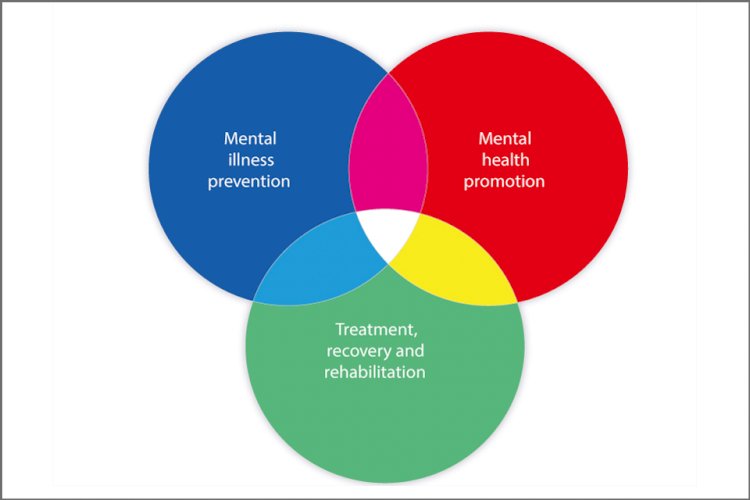
This image is property of www.reachpsych.com.
Reducing Stigma and Discrimination
Promoting education and awareness
Reducing stigma and discrimination surrounding mental health is crucial for improving the overall well-being of individuals and communities. By promoting education and raising awareness about mental health, we can help dispel myths and misconceptions. This can be achieved through school programs, community workshops, and media campaigns. When people are educated about mental health, they are more likely to understand and empathize with those who are experiencing mental health challenges.
Encouraging open dialogue
Encouraging open dialogue about mental health is another effective way to reduce stigma and discrimination. Creating safe spaces where people can openly share their experiences without fear of judgment or criticism can foster a sense of understanding and support. This can be done through support groups, community forums, and online platforms that promote anonymous sharing. By normalizing conversations about mental health, we can create a more inclusive society where individuals feel comfortable seeking help and support.
Challenging stereotypes
Challenging stereotypes and misconceptions about mental health is essential in reducing stigma and discrimination. It is important to recognize that mental health challenges can affect anyone regardless of their age, gender, or background. By challenging stereotypes through media campaigns, public awareness events, and education programs, we can break down barriers and promote a more accurate understanding of mental health. This can help individuals feel validated and increase their willingness to seek help when needed.
Creating supportive environments
Creating supportive environments is crucial for reducing stigma and discrimination and promoting mental well-being. This can be done by implementing workplace policies that prioritize mental health, providing training for educators and healthcare professionals on how to support individuals with mental health challenges, and creating community spaces that are inclusive and welcoming. By fostering an environment where individuals feel supported and understood, we can reduce the negative impact of stigma and discrimination on mental health outcomes.
Early Detection and Intervention
Identifying warning signs
Recognizing the warning signs of mental health challenges is vital for early detection and intervention. These signs can vary depending on the specific disorder, but some common indicators include changes in mood or behavior, withdrawal from activities, difficulty concentrating, changes in appetite or sleep patterns, and feelings of hopelessness or worthlessness. By being aware of these warning signs and taking them seriously, individuals and their support networks can intervene early and seek appropriate help.
Screenings and assessments
Regular screenings and assessments are important tools in identifying potential mental health issues. These screenings can be conducted by healthcare professionals, such as doctors or psychologists, and can help detect early signs of a mental health disorder. By incorporating mental health screenings into routine medical check-ups or school assessments, we can ensure that individuals receive timely and appropriate support.
Access to mental health services
Ensuring access to mental health services is crucial for early detection and intervention. This includes providing affordable and accessible mental health care, increasing the number of mental health professionals, and integrating mental health services into primary care settings. By removing barriers to accessing mental health services, individuals can receive the support they need at the earliest stages of their mental health challenges.
Implementing early intervention strategies
Implementing early intervention strategies can prevent the escalation of mental health challenges and improve outcomes. This can include early psychoeducation and support groups, cognitive-behavioral therapy, medication management, and family interventions. By providing these evidence-based interventions early on, individuals can develop effective coping mechanisms and prevent their mental health challenges from worsening.
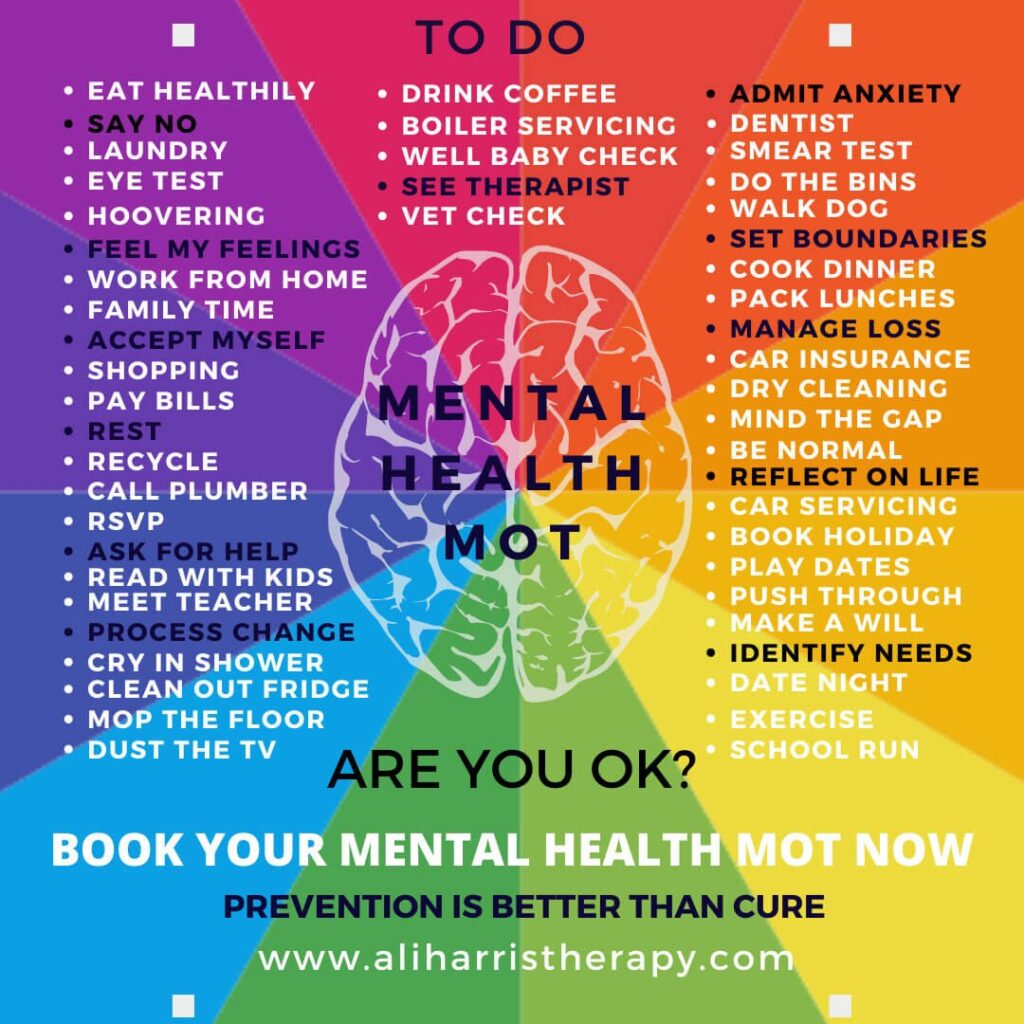
This image is property of images.squarespace-cdn.com.
Improved Quality of Life
Enhanced well-being
Prevention in mental health can lead to enhanced overall well-being. When individuals have access to early detection and intervention services, they can address their mental health challenges before they significantly impact their quality of life. By maintaining good mental well-being, individuals can experience improved mood, reduced stress levels, and better overall emotional and psychological functioning.
Increased productivity
Addressing mental health challenges early on can also result in increased productivity. When individuals receive appropriate support and treatment, they can better manage their symptoms and maintain higher levels of functioning. This can positively impact their ability to work, study, and engage in daily activities, leading to increased productivity and achievement.
Positive interpersonal relationships
Prevention and early intervention in mental health can greatly improve interpersonal relationships. When individuals address their mental health challenges, they are better equipped to communicate effectively, manage conflicts, and maintain healthy boundaries. This can lead to stronger relationships with family, friends, and colleagues, enhancing overall social support and reducing feelings of isolation.
Greater overall life satisfaction
By prioritizing prevention in mental health, individuals can experience greater overall life satisfaction. When mental health challenges are addressed early on, individuals can develop effective coping skills, build resilience, and experience a greater sense of control over their lives. This, in turn, can lead to increased self-esteem, a more positive outlook, and a greater sense of satisfaction in various areas of life.
Preventing Mental Health Disorders
Promoting mental wellness
Prevention in mental health involves promoting mental wellness and resilience. This can be achieved through various strategies, such as psychoeducation on stress management, mindfulness practices, and promoting healthy lifestyle choices. By focusing on mental wellness, individuals can develop protective factors that reduce the risk of mental health disorders.
Addressing risk factors
Identifying and addressing risk factors is essential in preventing mental health disorders. Risk factors can include genetic predisposition, adverse childhood experiences, substance abuse, and chronic stress. By targeting these risk factors through interventions and support systems, individuals can reduce their likelihood of developing mental health disorders.
Teaching coping skills
Prevention efforts should focus on teaching individuals effective coping skills to manage stress, regulate emotions, and problem-solve. Positive coping mechanisms, such as exercise, social support, and engaging in enjoyable activities, can help individuals navigate difficult situations and reduce the risk of developing mental health disorders.
Reducing the likelihood of developing disorders
By promoting mental wellness, addressing risk factors, and teaching coping skills, prevention efforts can significantly reduce the likelihood of individuals developing mental health disorders. Taking a proactive approach to mental health can empower individuals to take control of their well-being and prevent the onset of more serious mental health challenges.
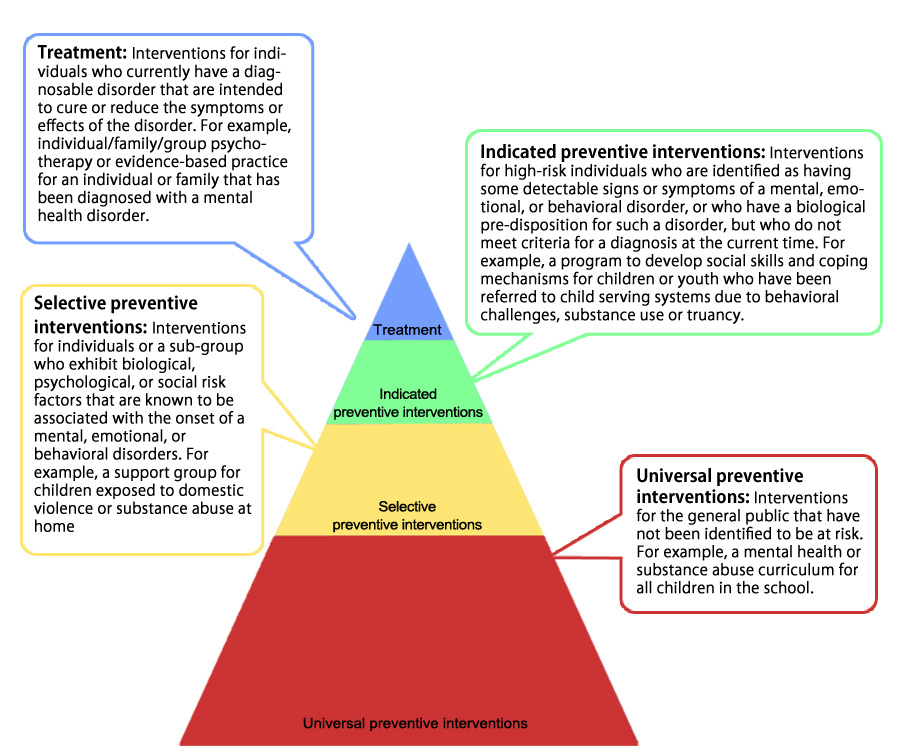
This image is property of youth.gov.
Reducing the Burden on Healthcare Systems
Easing strain on resources
Prevention in mental health can help ease the strain on healthcare systems. By prioritizing early intervention and prevention strategies, individuals are less likely to require intensive and costly mental health interventions in the future. This can free up resources to be allocated to other areas of healthcare.
Minimizing healthcare costs
Prevention efforts in mental health can also help minimize healthcare costs. By addressing mental health challenges at the earliest stages, individuals can avoid costly hospitalizations, emergency room visits, and long-term treatments. Investing in prevention leads to significant cost savings in the long run.
Decreasing hospitalizations
Prevention strategies can help decrease the need for hospitalizations related to mental health challenges. By prioritizing early intervention and ensuring access to appropriate support services, individuals can receive the help they need before their condition deteriorates to the point of requiring hospitalization.
Allocating resources more efficiently
By implementing prevention strategies, healthcare systems can allocate resources more efficiently. Rather than solely focusing on treating existing mental health disorders, resources can be directed towards prevention efforts, early intervention services, and promoting mental wellness. This ensures that resources are used to support individuals at all stages of their mental health journey.
Increasing Resilience and Protective Factors
Building resilience skills
Promoting prevention in mental health involves building resilience skills. Resilience refers to an individual’s ability to adapt and bounce back from adversity. By incorporating resilience-building activities, such as stress management techniques, problem-solving exercises, and social support networks, individuals can develop protective factors that enhance their overall well-being and reduce their vulnerability to mental health challenges.
Enhancing self-esteem and self-confidence
Addressing mental health early on can also enhance self-esteem and self-confidence. By providing support, validation, and appropriate interventions, individuals can develop a sense of self-worth and belief in their own abilities. This positive self-perception can act as a protective factor against mental health disorders.
Supporting social connections
Prevention efforts should focus on supporting social connections and relationships. Human connection and social support play a crucial role in maintaining good mental health. By fostering supportive relationships, individuals can access emotional support, practical assistance, and a sense of belonging, which can buffer against mental health challenges.
Fostering a positive environment
Creating a positive environment is essential for increasing resilience and protective factors. This can be achieved through promoting inclusive and supportive communities, implementing anti-bullying policies in schools, and ensuring workplaces prioritize mental health and well-being. By fostering a positive environment, individuals are more likely to develop the social, emotional, and psychological resources needed to prevent mental health disorders.
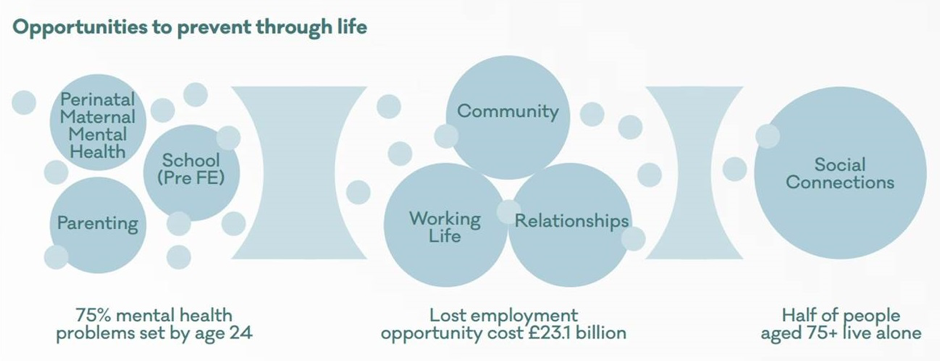
This image is property of www.nationalelfservice.net.
Promoting Long-Term Recovery
Preventing relapse
Prevention efforts in mental health also aim to prevent relapse in individuals with existing mental health disorders. By providing ongoing support, access to resources, and reinforcing healthy coping strategies, individuals can reduce the risk of relapse and maintain their mental well-being in the long term.
Providing ongoing support
Long-term recovery requires ongoing support. Prevention efforts should include access to support services, such as counseling, peer support groups, and case management. By addressing the ongoing needs of individuals with mental health challenges, we can ensure that they receive the necessary support to maintain their recovery.
Offering resources and tools
Prevention efforts should provide individuals with mental health challenges the necessary resources and tools to manage their condition. This can include self-help materials, digital resources, and access to evidence-based interventions. By equipping individuals with the knowledge and tools they need, we empower them to take an active role in their recovery.
Facilitating positive lifestyle changes
Promoting long-term recovery involves facilitating positive lifestyle changes. Prevention efforts can include providing education on healthy behaviors, such as regular exercise, balanced nutrition, and adequate sleep. By encouraging individuals to adopt positive lifestyle changes, we support their overall well-being and resilience.
Minimizing the Impact of Trauma
Recognizing and addressing trauma
Prevention efforts in mental health must include recognizing and addressing trauma. Traumatic experiences can have a significant impact on an individual’s mental health and well-being. By acknowledging and validating the experiences of those who have endured trauma, we can provide appropriate support and interventions to help them heal.
Utilizing trauma-informed care
Trauma-informed care is an important approach in preventing the negative impact of trauma. This approach recognizes the widespread impact of trauma, promotes physical and emotional safety, and empowers individuals to regain control over their lives. By implementing trauma-informed care practices, individuals are less likely to develop mental health disorders as a result of their trauma.
Preventing long-lasting negative effects
Prevention efforts aim to prevent long-lasting negative effects of trauma. By providing immediate support, access to counseling and therapy services, and appropriate interventions, individuals can recover from trauma and reduce the risk of developing mental health disorders later in life.
Supporting trauma recovery
Promoting prevention in mental health involves supporting individuals in their trauma recovery journey. This can include access to trauma-specific interventions, such as Eye Movement Desensitization and Reprocessing (EMDR) therapy, trauma-focused cognitive-behavioral therapy, and support groups. By offering a range of support services, individuals can find the resources that best fit their needs and aid in their trauma recovery.
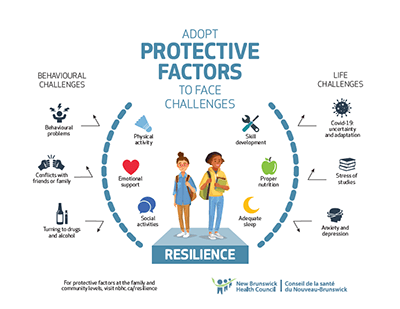
This image is property of nbhc.ca.
Building a Resilient Society
Creating a mentally healthier population
Prevention efforts seek to create a mentally healthier population. By prioritizing mental health education, promoting access to mental health resources, and implementing policies that support mental well-being, we can build a society that values and prioritizes mental health. This involves a collective effort from individuals, communities, and institutions to address mental health challenges proactively.
Reducing societal disparities
Prevention in mental health also aims to reduce societal disparities and inequalities. Mental health challenges can disproportionately affect certain populations, such as minority communities, low-income individuals, and individuals facing discrimination. By addressing social determinants of mental health and working towards equity, we can reduce the burden of mental health disorders on marginalized communities.
Promoting equity and social justice
Prevention efforts should encompass a commitment to equity and social justice. This involves challenging systemic barriers that contribute to mental health challenges, advocating for policies that promote fairness and equal opportunities, and addressing the social determinants of mental health. By promoting equity and social justice, we create a foundation for a resilient and mentally healthy society.
Strengthening communities
Building a resilient society involves strengthening communities. This can be achieved through community-based prevention programs, fostering social connections, and promoting community resilience. By addressing the unique needs and resources of each community, we can create environments that support and uplift individuals, reducing the prevalence of mental health disorders.
Encouraging Holistic Approaches
Addressing mental health in all aspects of life
Encouraging a holistic approach to mental health involves recognizing that mental health is interconnected with all aspects of life. Prevention efforts should include addressing mental health in educational settings, workplaces, healthcare systems, and community spaces. By integrating mental health into all aspects of life, we can promote overall well-being and reduce the likelihood of mental health disorders.
Considering mind-body connection
Prevention efforts should also consider the mind-body connection. Mental health challenges can manifest in physical symptoms, and physical health can impact mental well-being. By promoting practices that support both mental and physical health, such as exercise, nutrition, and stress management, individuals can experience greater overall well-being.
Promoting healthy lifestyles
Prevention in mental health involves promoting healthy lifestyles. This includes encouraging individuals to engage in regular physical activity, maintain a balanced diet, get enough sleep, and avoid substance abuse. By prioritizing healthy lifestyles, individuals can reduce their vulnerability to mental health challenges and improve their overall well-being.
Supporting overall well-being
Encouraging a holistic approach to mental health means supporting overall well-being. Prevention efforts should include access to resources and interventions that promote emotional, social, and spiritual well-being. By taking a comprehensive approach to mental health, individuals can experience a greater sense of fulfillment and satisfaction in their lives.
In conclusion, prevention is better in mental health because it focuses on promoting education and awareness, early detection and intervention, improved quality of life, preventing mental health disorders, reducing the burden on healthcare systems, increasing resilience and protective factors, promoting long-term recovery, minimizing the impact of trauma, building a resilient society, encouraging holistic approaches, and supporting overall well-being. By prioritizing prevention, we can create a society that values mental health, supports individuals in their recovery journey, and reduces the prevalence of mental health disorders.
